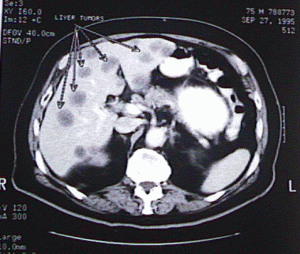“Sopranos” star loses battle with liver cancer

Denise Borino-Quinn, who played mob wife Ginny Sacrimoni on The Sopranos , has lost her long battle with liver cancer. She was 46 years old. Borino-Quinn, who had no previous acting experience, got the role during an open casting call, which she attended to support a childhood friend. The actress, whose character was known for her issues with her weight, actually lost 175 pounds after completing the show, thanks to stomach stapling surgery. Borino- Quinn had lost her husband, Luke Quinn in March. The couple had no children. Denise Borino-Quinn worked at a legal firm, when she was not acting.
Primary Liver Cancer (Source: National Cancer Institute)
Adult primary liver cancer is a disease in which malignant (cancer) cells form in the tissues of the liver.
 The liver is one of the largest organs in the body. It has four lobes and fills the upper right side of the abdomen inside the rib cage. The liver has many important functions, including:
The liver is one of the largest organs in the body. It has four lobes and fills the upper right side of the abdomen inside the rib cage. The liver has many important functions, including:
- Filtering harmful substances from the blood so they can be passed from the body in stools and urine.
- Making bile to help digest fats from food.
- Storing glycogen (sugar), which the body uses for energy.
Anatomy of the liver: The liver is in the upper abdomen near the stomach, intestines, gallbladder, and pancreas. The liver has four lobes. Two lobes are on the front and two small lobes (not shown) are on the back of the liver.
This summary refers to primary liver cancer ( cancer that begins in the cells of the liver). Metastatic liver cancer, which is cancer that begins in other parts of the body and spreads to the liver, is not discussed here. Primary liver cancer can occur in both adults and children. Treatment for children, however, may be different than treatment for adults.
The following are possible risk factors for adult primary liver cancer:
- Having hepatitis B and/or hepatitis C.
- Having a close relative with both hepatitis and liver cancer.
- Having cirrhosis (scarring of the liver and poor liver function as a result of chronic liver disease)
- Eating foods tainted with aflatoxin (poison from a fungus that can grow on foods, such as grains and nuts, that have not been stored properly).
Possible signs of adult primary liver cancer include a lump or pain on the right side. These symptoms may be caused by swelling of the liver. These and other symptoms may be caused by adult primary liver cancer or by other conditions. A doctor should be consulted if any of the following problems occur:
- A hard lump on the right side just below the rib cage.
- Discomfort in the upper abdomen on the right side.
- Pain around the right shoulder blade.
- Unexplained weight loss.
- Jaundice (yellowing of the skin and whites of the eyes).
- Unusual tiredness.
- Nausea.
- Loss of appetite.
 How is liver cancer diagnosed?
How is liver cancer diagnosed?
Liver cancer may be diagnosed by a physical examination or by imaging tests. To confirm a diagnosis of liver cancer, doctors may use blood tests, ultrasound tests, computer tomography (CT) scans, magnetic resonance imaging (MRI), and angiograms. The doctor may also need to do a liver biopsy. During a biopsy, a small piece of liver tissue is removed and studied in the lab.
The prognosis (chance of recovery) and treatment options depend on the following:
- The stage of the cancer (the size of the tumor, whether it affects part or all of the liver, or has spread to other places in the body).
- How well the liver is working.
- The patient’s general health, including whether there is cirrhosis of the liver.
There are many treatment options for those with liver cancer including:
- Surgery
- Cryosurgery: uses a metal probe to freeze and destroy cancer cells.
- Radiofrequency Ablation: uses a special probe to destroy cancer cells with heat.
- Ethanol Injection: Ethanol (alcohol) is injected directly into the liver tumor to destroy cancer cells.
- Chemotherapy or chemoembolization: Chemotherapy uses drugs to destroy cancer cells. In some cases, the chemotherapy can be directly injected into the liver tumor.
- Radiation therapy: uses radiation (high-energy x-rays) to destroy cancer cells
- A small number of liver cancer patients are eligible for liver transplantation as a cure for liver cancer
- New biologic medications are being investigated for liver cancer. Biologics use the patient’s immune system to fight the cancer.
For more details on treatment of liver cancer, as well as general information on liver cancer, click here to go to the Resounding Health Casebook on Liver Cancer.

























0 comments